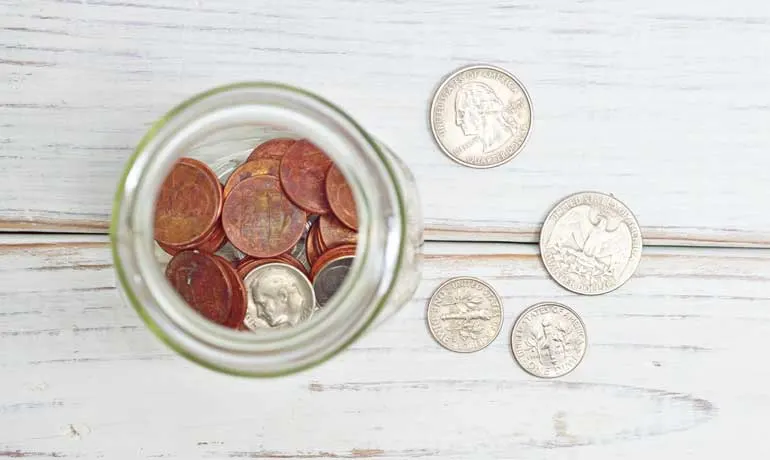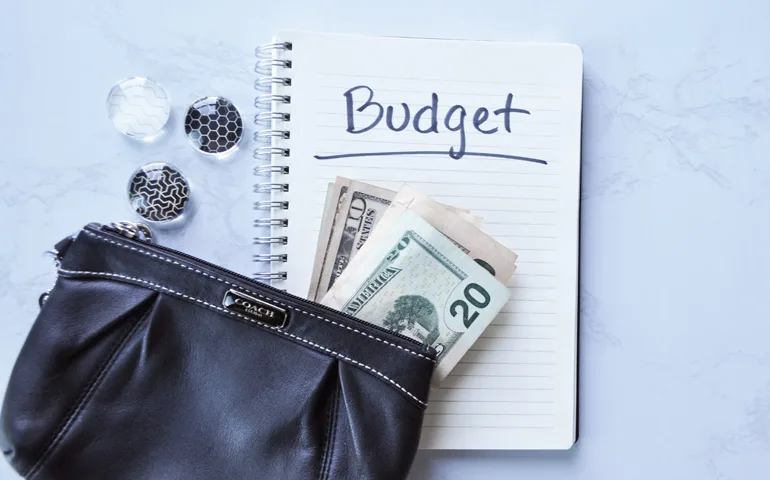Managing money well is nothing short of amazing. It takes time to learn and develop the budgeting skills necessary to win with money.
I mean, it’s not like we were inherently born with this important life skill. Although, that would be nice!
Have you heard the saying you need 10,000 hours of practice to become an expert at something? While I’m not saying you’ll need that many hours to master your budgeting skills (plus turns out hat theory was wrong anyway), I am saying that you should give yourself some grace if you haven’t gotten it quite right yet.
I’ve been obsessed with personal finance for over 15 years. As a money coach, I’ve seen people go from having no idea how to manage money to absolutely crushing their money goals.
Top budgeting skills to be financially successful

This post may contain affiliate links. For more info, see my disclosures.
Here are the budgeting skills that will take your money from snoozeville to the astonishing.
Oh, and if you’re looking for basic budgeting principles, check out Budgeting 101: How to Make a Budget
1. Become detail-oriented
Whether you’re naturally a detailed person or you like things more high-level, this is an important budgeting skill. Attention to detail can be an adjustment for some, but that detail will help you get control over your money.
Know these numbers in detail…
- How much do you make each month?
- How much are you spending?
- What are your investments?
- Exactly where is your money going?
Digging into the details and paying attention to what you earn, spend, invest and save will help you gain control over your money.

2. Learn how to balance your money
If you’re budgeting strategy is using an app, a spreadsheet on your computer or a pen and paper, balancing is key. You should be able to balance your budget to your bank account at any time.
So if you’re using an app that syncs with your bank account, those numbers for each account should read the same across all platforms. If you’re manually tracking your spending, you’ll want to make sure you enter each receipt or each expense to make sure that your written budget matches your bank account balance.
If there’s a gap and your accounts are not balanced – it’s time to find where that money went! Sometimes it’s a transaction you forgot about and sometimes it’s a technology glitch where the budgeting app doesn’t pull in all the transactions. Find it and balance your accounts!
3. Easily identify needs vs wants
Okay, I know you know this. We all learned it in elementary school, right? But it’s a behavioral thing. We want what we want, and don’t want to admit when we’re careless with our spending.
- We need Netflix.
- That drive-through coffee / lunch / dinner. Need that too.
- We really need that new tech / pair of shoes / home decor item…you fill in the blank here.
We think we need these things but we actually don’t. Being honest with ourselves about wants versus needs is a key to making your budget work.
Cut the excess and trim the budget to reach your money goals!

4. Learn to negotiate
Can we talk about the art of negotiation for a second? Expert budgeters know how much they want to spend in certain areas in their life, and won’t go over that amount.
That sometimes takes negotiation – and sometimes it’s being patient to watch for a sale! You might be surprised to see how many things are truly negotiable. Sure a new house or new car can be negotiated, but so can a ton of other things.
Here are top things to negotiate that you maybe haven’t thought of:
- Internet bill
- Annual credit card fee
- New electronics
- Cell phone bill
- Vacation rentals
- Medical bills
- Insurance
- Debt
- Professional services
Negotiating in any one of these categories can have an impact on your budget. And the more money you save from negotiation, the better off your budget will be!
If you’re new to the art of negotiating, check out these 11 ways to negotiate.
5. Pay yourself first (an essential budgeting skill)
Learning how to pay yourself first is crucial to being successful with your money. This is an important budgeting skill because it becomes part of your process. Whether you make it automatic or you manually transfer the money, learning this skill will create savings habits which is essential for your future.
There’s many ways you can pay yourself first:
- Contributing to a retirement fund through your employer
- Setting up automatic transfers (through your payroll at work) directly into another savings account so it never hits your main spending account
- Creating automatic transfers from your main account (after your paycheck was deposited) to a separate savings account, before you spend any money
- Once you get paid, sitting down to do your budget and making transfers to a savings account to meet savings goals

6. Be pro-active instead of reactive
In the case of budgeting, being pro-active is setting a plan for your money, instead of watching it go to things that maybe aren’t part of your goals.
So for instance, if you want to save $5,000 this year, you’ll need to put a plan in place to save $416 every month for the next 12 months. Often times, when we don’t put that plan into place, the money dwindles away.
Be pro-active. Set goals. Execute the plan to achieve them.
7. Budgeting skill: be diligent to check in frequently
When it comes to budgeting skills for adults, being diligent to check in with your money frequently is important. So once you set up your budget at the beginning o the month, you’ll need to actually look at it periodically to make sure you’re on track!
Some people look at their app or cash envelopes every day to check their balance and see where their spending is at. Others check in weekly and just make it a date with your significant other – or yourself!
Learning to be diligent to check in on your money creates a better understanding of your financial situation, which means you’ll be able to take quick action when something goes wrong.

8. Use sinking funds effectively
Sinking funds are really just a silly term for saving money in advance for things you know you’ll need later. Unlike an emergency fund, used for the unexpected, sinking funds are savings for things you plan to spend, just not right now.
Good examples of sinking funds are holiday gifts, annual vacations or a washer and dryer that will need to be replaced soon.
Identify those things that cost more than what you can feasibly pay for in a regular monthly budget, but you know you’ll need to spend. Then divide that up by the number of months until you expect to spend that money. Save that every month!
Regularly contributing to sinking funds creates more stability in your budget and less ‘oh crap’ moments later.
9. Manage credit cards wisely
I could write a whole blog post about this topic, but for now I’ll just hit the high points. Managing credit cards wisely is one of the most crucial budgeting skills on this list because it can dramatically impact your budget.
A couple key rules to managing credit cards as it relates to budgeting:
- Best practice is to pay your cards off in full every month. My husband and I pay ours off every 2 weeks so we’re absolutely sure to not carry a balance!
- If you’re currently carrying a balance on credit cards, be sure to pay the minimum (and more) every month on time.
- Make sure to include any credit card interest or fees in your monthly budget. Make a line item for this and plan for it monthly.
Let there be no surprises when it comes to credit cards. The point of budgeting is to get your money on track and take control over it. I highly recommend to use any excess money you have through budgeting to pay off your credit cards. That high interest is a real killer to your long-term financial goals!

10. Learn how to say NO
The art of saying no. It’s a challenge for many and mastered by few.
It takes self-discipline. Saying no is all about aligning your money, values and goals in order to focus on what you really want. Then the no becomes easy.
Want to stop by happy hour tonight? No – gotta work on getting out of debt.
Want to go to your friend’s MLM party? Nope, saving up for vacation instead.
How about buying that beauty subscription box that promises perfection? That’s a hard no, until it fits in the budget better.
When facing temptation, ask yourself these questions:
- Is this what I want most, or just what sounds good right now?
- Will saying yes to this help me reach my next savings, debt-payoff or investing goal?
- A year from now, will this spend still make me happy and fulfilled? Or can I just save the money instead?
Saying no can have a huge impact to your budget. It’s a big reason how my husband and I paid off over $100,000 in debt. Learn the art of saying no with confidence!
More budgeting skills to master
All of these budgeting skills are important, and the more you master the better you’ll be with money. Let’s keep going.

11. Pay bills on time
Here’s an easy budgeting skill: paying bills on time. The easiest way to do this is to make as many payments as possible automatic. Set up payments through a bill pay service through your bank or with the merchant directly.
For those bills you can’t pay automatically, that’s where #7 above comes in – checking in frequently. By paying attention to your finances and what’s due, you’ll be sure to not miss a payment.
By paying bills on time, your fixed expenses within your budget should be accurate each month. You’ll avoid late fees, too!
12. Learn how to increase your income
Often times we turn to budgeting when we’re not managing money properly. We’re stressed, overwhelmed and wanting to make a change.
Budgeting does help you gain control of your money. It’s a very effective way to get ahead with your finances. However, sometimes your money problems can also be improved with more income.
Let me just caveat this to say that you still need to know how to manage money. Whether you make $25,000 per year or $250,000 per year, learning the skills you need to manage it well matters.
More money wont’ solve all your problems! But increasing your income can help bring in more money to tackle those money goals.
Here are a few ideas on ways to increase your income:
- Advancing your career through promotion, education or certifications
- Changing your job to a higher earning career
- Getting a 2nd job
- Starting a side hustle
- Selling your old stuff
Related read: How to Save $1000 in 30 Days

13. Manage your income when you get a raise or bonus
In addition to seeking out new ways to increase your income, when you get a raise, bonus or other financial windfall, it’s essential to know what to do with it.
Next time you get an annual bonus, tax refund or other surprise money landing in your lap, use it wisely!
Make a plan to be responsible with a portion of it then have a bit of fun with the rest. So for instance maybe 80% of it goes towards debt and the other 20% goes towards something you’ve wanted to buy for a long time but it just hasn’t been in the budget.
You decide what the portions are, just make sure to be responsible with some of it. You’ll thank yourself later.
When you get a raise, it’s a little different because it’s not typically super impactful every month, but adds up over time. So let’s say you get a 3% raise. You could go to your HR department right away and increase your retirement contribution by 3%.
You’ll thank yourself when it comes closer to retirement.
Alternatively, you could take a portion of it – let’s say 1% to increase your retirement. The other 2% will go to your paycheck and end up in your budget. Figure out how much the new paycheck is versus the last one, and make a line item in your budget every month to take that exact amount and put it towards a savings goal.
By doing this, your budget becomes stronger because you’re telling that money that you worked hard for what it needs to do: work for you! Over the years, this powerful budgeting skill will add up progressively and lead you to crushing your money goals.
14. Pursue contentment
Being content is essentially being happy with what you have.
Why is that important when it comes to budgeting? Well if you’re content, then you desire less. Which means you spend less. And that means your budget is simpler.
Less spending should equal less bills, less debt and more savings. When you find peace and contentment with your life and your situation, your money will naturally get a lot easier to manage.
You may also like: 15 Powerful Budgeting Strategies to Overcome Your Budgeting Woes

15. Practice the art of intention (one of the best budgeting skills there is!)
If you’re trying to get out of debt, save money or start preparing for a financially stable future, being intentional with your money is key! It’s one of the foundational budgeting skills.
The reason for creating a budget is to gain control of your finances. Part of that control is telling your money where to go, instead of wondering where it went.
By intentionally setting a budget, sitting down to review your numbers, and being intentional about saving money in key areas, you’ll have budgeting success. It may take time, but by being very intentional with how you make, spend, save and invest money, you will achieve your financial goals.
16. Forecast for the future
Do you know what your money’s job will be next week? Next month? Or next year? How about in 5 years?
Every dollar you make should have a job. Being able to look at every facet of your life: career, family, hobbies, investments, goals and so on. Your future will impact your finances and you’ll need to shift your budget over time to account for those changes in life.
Are you craving a dream vacation? You might need to put more money in a travel fund now versus in the future you could put only half as much in each month.
Maybe you’re saving for a new house, new car or other large purchase. Or, if you’re not saving for that now, maybe you will be next year or in 5 years.
The point is to take a look at your life, your goals and your money and think about how your budget will need to change in order to support you.

17. Have fun with money
In case nobody has told you recently: money is fun!
The budgeting part can be stressful and complicated and otherwise make you want to pull your hair out. But after you get on track with budgeting and start making real progress towards your money goals, you’ll notice money can be fun.
(Note – I highly recommend to be debt free before going all out in this area. Set yourself up for success, okay?)
Money is a tool for your life. When you align your spending with your values, it just clicks – money becomes fun.
- Love giving gifts? Put it in the budget.
- Obsessed with the latest fashion or tech trend? Make some room for that, too.
- Care deeply about a cause? Give back graciously!
- Want to pass real wealth down to future generations? Make sure an investing line item is in your budget.
You work hard for your money. You should be able to have some fun with it!
Related read: 100 Practical and Interesting Things to Save For
18. Understand your net worth
I know what you’re thinking: how does net worth relate to budgeting?
Well, what’s your purpose of budgeting? Is it to just change how you are now with money – to get ‘caught up’ – or is it to always know how to manage your money?
Of course it’s nice to change the current situation. But it’s even better to always be good with money.
An advanced budgeting skill is tying net worth into a budgeting practice. I recommend at least quarterly to look at your net worth. If you have specific wealth building goals, it’s better to do it monthly.
This ties back to your budget through effective savings strategies. Some questions that commonly come up:
- Are you debt free or moving in that direction?
- Is your net worth going up as you pay things off and accumulate assets that grow over time?
- How can you make room in your budget to ensure your financial future is solid?
- What pieces of your budget can you get rid of and where can you divert that money so it’s growing and working for you?

19. Avoid new debt (an essential budgeting skill to master)
Critical budgeting skills alert: after you’ve climbed out of debt, built a savings fund and are a master at budgeting, set yourself up for success by utilizing sinking funds effectively.
Yes, we talked about them earlier on a smaller scale. Now let’s level up and think bigger. Save up for larger items in advance so you won’t have to take on new debt.
Like a new car. Or home remodeling project. How about a vacation home?
Every time you pay interest in the form of debt you pay more than the value of that item. You give extra money to someone just because you can’t afford to buy it outright at the time of purchase.
Of course it can take a long time to save up a lot of money, especially when you’re talking about tens of thousands of dollars. But do you know what?
Once your monthly payments from debt are gone, you’ll likely have more freedom and flexibility in your budget – not to mention all these awesome budgeting skills! So you’ll be able to save faster than maybe you can right now.
20. Practice patience
I may have saved the best – or maybe the most important – for last. In nearly all of these categories, patience matters. Being patient with yourself is huge when it comes to budgeting. And you’ll make mistakes along he way – we all do!
It’s hard to be patient when tackling a money goal, but it’s important. Follow the process. When you’re super motivated to clear our debt or grow your savings, it can be so difficult. But it will be worth it in the end!

Budgeting skills to last a lifetime
There you have it… 20 budgeting skills that you should master in order to be financially successful. While we all measure success differently, one thing is for sure: it feels really good to hit those money goals!
That was a long list…let’s take a quick recap.
Budgeting skills to master
- Become detail-oriented
- Learn how to balance your money
- Easily identify needs vs wants
- Learn to negotiate
- Pay yourself first
- Be pro-active instead of reactive
- Diligent to check in frequently
- Use sinking funds effectively
- Manage credit cards wisely
- Learn how to say NO
- Pay bills on time
- Learn how to increase your income
- Manage your income when you get a raise or bonus
- Pursue contentment
- Practice the art of intention
- Forecasting the future
- Have fun with money
- Understand your net worth
- Avoid new debt
- Practice patience
Alright so what do you think you’ll work on first? Drop it in the comments below!
Related content you may enjoy:
6 Steps to Build an Emergency Fund
55 Ways to Save Money
Importance of Savings: 10 Reasons to Save and 8 ways to Make it Happen
Find this article helpful? Save it for later or share it on social media!


Alice Peace
Friday 9th of April 2021
This is such a wonderful article on budgeting. So glad I stumbled across your blog as i'm using the pandemic to really get hold of my finances to travel once we're allowed! Off to read more now. Cheers!
Nikki
Friday 9th of April 2021
Yes Alice! What a great opportunity to re-evaluate things, including finances. Glad you found some inspiration today. :)
Allison
Tuesday 9th of February 2021
This is some great advise. The road to financial security is usually paved with good intentions, unfortunately our immediate want tend to take priority and our intentions get tossed out the window. Thanks for the tips. I look forward to reading more of your posts.
Nikki
Tuesday 9th of February 2021
You're so right Allison. Asking yourself "what do I want most?" vs "what do I want now?" has been a game-changer!
free2livefree2roam
Tuesday 9th of February 2021
After years of hard work, we are debt-free, which gave us the freedom to roam! I say cut up those credit cards and put your money to work for you! Financial Freedom is awesome!
Nikki
Tuesday 9th of February 2021
Woo-hoo! Yessssss! I really love being debt-free, too :)
Sabrina
Tuesday 9th of February 2021
These are great tips. All 20 of them. I use sinking fund savings for vacation and Christmas Gifts and I always pursue contentment. More stuff does not always make us happy. Thanks for sharing.
Nikki
Tuesday 9th of February 2021
Aww thanks so much! I'm right there with you.... experiences over things! And using sinking funds for vacations and holidays is so critical.
Linda
Tuesday 9th of February 2021
This is a great article on budgeting. Very good specific tips. I do like to donate to charities at Christmas and I do put it in my Christmas budget.
Nikki
Tuesday 9th of February 2021
That's so awesome, Linda! Budgeting for giving is the easiest way to ensure it happens. :)